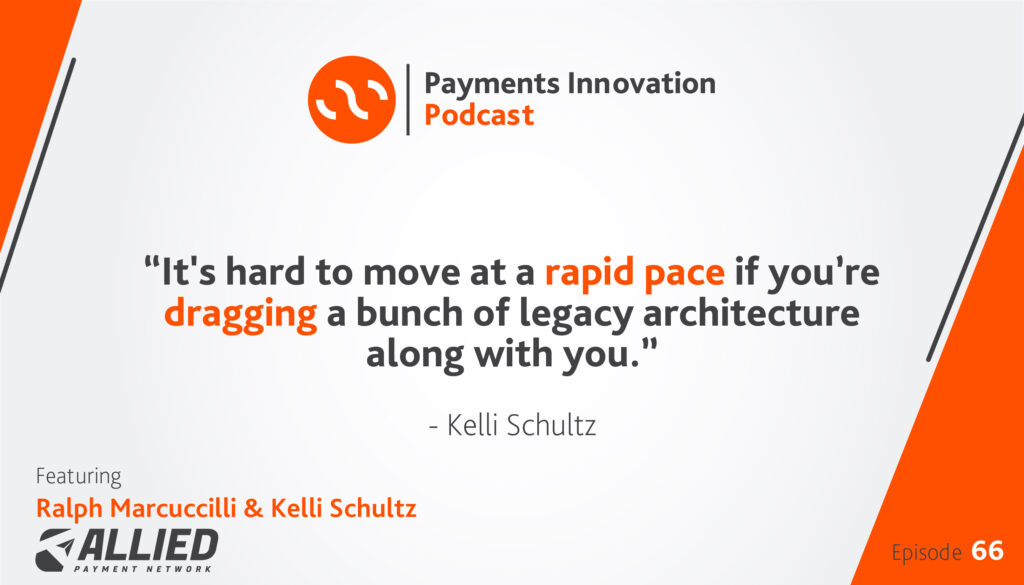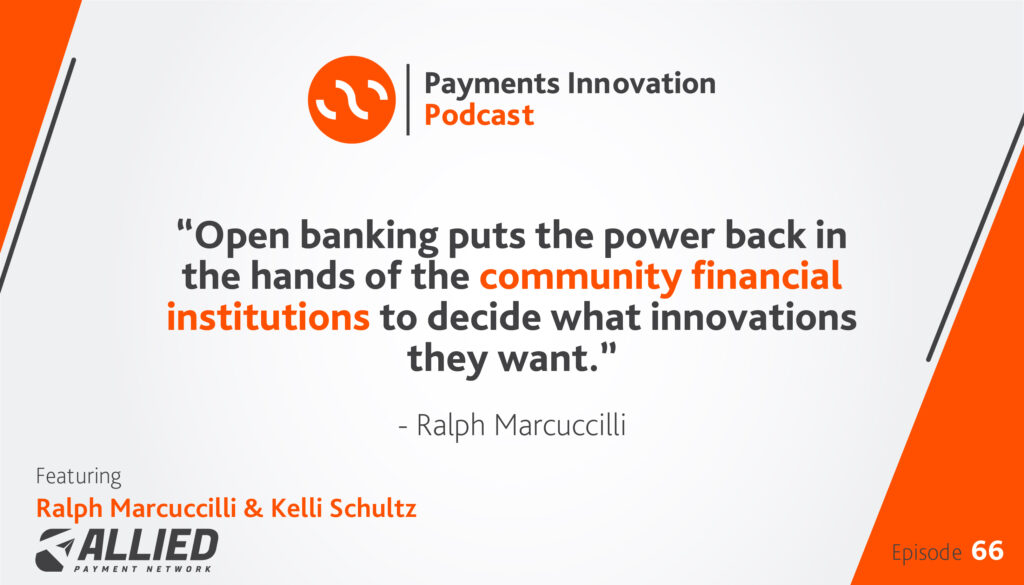The concept of open banking is driving innovation across the financial services landscape. Innovation is faster, more efficient, and more accessible. Community banks and smaller financial institutions can now access the tools and resources to build out niche products, such as apps and feature sets for their customers.
On a recent episode of the Payments Innovation podcast, I sat down with Allied Payment Network’s Founder & CEO, Ralph Marcuccilli, and their President, Kelli Schultz. They explained the ins and outs of open banking, and what it can mean for smaller financial institutions
Ralph was a 20-year veteran of the banking industry, and, in 2010, he founded Allied Payment Network, where Kelli is now the President. She comes from 2 decades of experience in and around the networks surrounding banking platforms.
Allied was well-positioned for open banking
Take yourself back to 2010, which is when Ralph founded Allied, while the rest of us were just purchasing our first iPhones. (Ralph certainly picked an exciting time to try and upend the game of bill payment, which was Allied’s original offering!)
Since then, Allied has added other offerings, such as Account-to-Account payments and PicturePay®, which allows customers to snap a photo of a bill and then pay it through their mobile device, and a host of other products.
All of these offerings are geared toward community banks and credit unions, giving them access to a host of products without having to build out all their own tech.
I asked Kelli and Ralph how they’ve been able to stay ahead of the innovation curve, and here’s what they said:
1) ‘Allied was born in the cloud’
To put it plainly, “Allied was born in the cloud,” said Kelli. That starting point has made it incredibly easy to maneuver and deploy their products as innovation has accelerated.
2) Allied has an API-driven vision
Because of Allied’s API methodology, they’re able to give their customers (credit unions and community banks) a way to easily adopt Allied’s suite of products, but still customize the functionality to a degree.
And, here’s the kicker: their API-driven mentality positioned Allied perfectly for the onset of open banking.
Open banking: the answer for smaller financial institutions
Without open banking, a smaller financial institution is limited in the offerings they can provide their niche markets — having to rely on the wide scale adoption and development of banking products by larger entities.
But with open baking, a community bank can create their own app or feature set tailored to the markets they know best. Overall, community financial institutions understand their niche markets better than anyone, and they know what needs are not being well-served.
To drill down a bit, consider software before mobile app marketplaces. If you wanted a particular software, you went to the store, purchased the software, and then installed it on your device. This clunky system severely restricted which software a store would carry, let alone what would be developed at all.
But with mobile app marketing places, consumers can directly download the software (apps) they want, and it’s efficient for all players involved to create software for niche markets.
In the same way, open banking platforms put the power of app and feature creation back in the hands of community banks and credit unions, so that they can serve their markets with tailored products.
Open banking can serve small but growing businesses
Small businesses have been a traditionally underserved market — and they’re one about which Kelli is very passionate.
First, consider the journey of a business owner. — typically they start out as solopreneur, then move into a very small outfit, before becoming a well-established business.
But, currently, small businesses often have the option of using either the retail banking solutions available (or even consumer options) or purchasing a larger made-for-enterprise product. Typically, a small business is priced out of the latter and needs more functionality than the former.
The other issue is the simple loss of data. As an entrepreneur grows from a solopreneur to a larger and larger business, they need banking products that will grow with them, unlocking functionality as their business matures, as opposed to moving to different banking products several times along that journey, losing data and records along the way.
Currently, no banking product serves the needs of growing small business particularly well, in Kelli’s mind, but “we are doing our part” to provide those solutions, she said. And, to both Kelli and Ralph, open banking will likely be the conduit through which those solutions are created.
Allied’s next product: real-time bank payments
Soon, Allied will have a real-time bill payment solution they are rolling out. This solution will take money from a customer’s checking account and post it onto a biller’s system within minutes.
Keep your eyes peeled — it should arrive within a couple months!
To ensure that you never miss an episode of Payments Innovation, subscribe on Apple Podcasts, or Spotify, or here.
Until next time!



